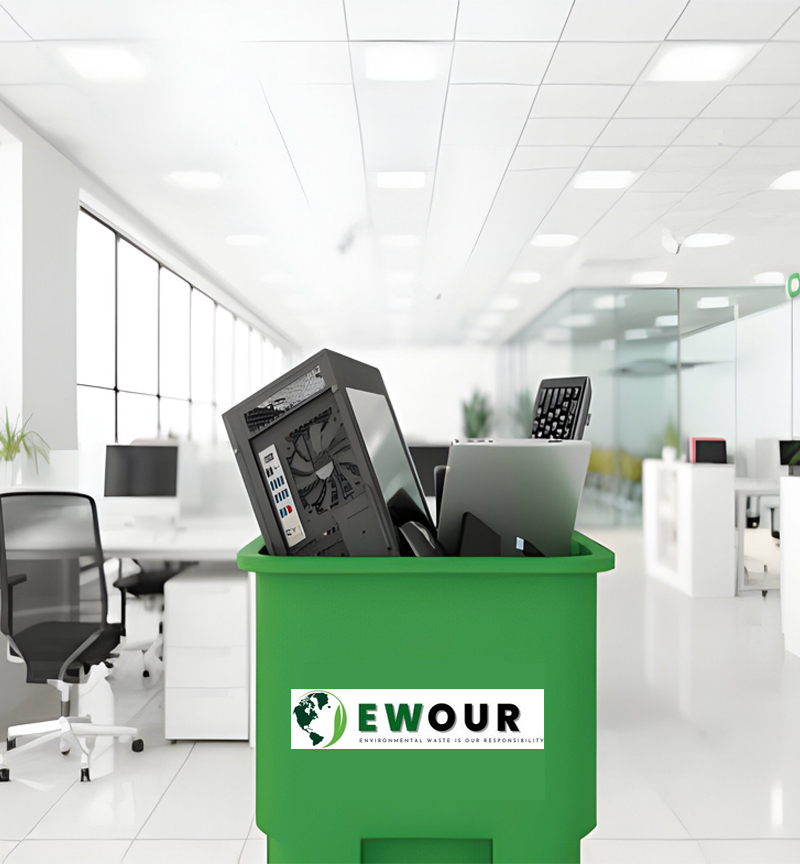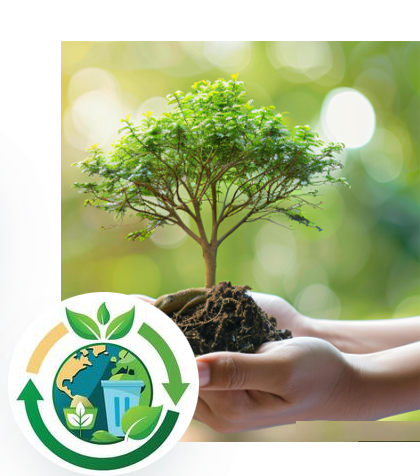EPR Registration for E-Waste Manufacturers & Importers
In 2011 the surrounding government pushed the finger in Extended Producer Responsibility (EPR) law, which made manufacturers responsible for ecologically sound management of their production e-waste. EPR mandatory for E-Waste Management Registration /certification is the precondition to overcome all producers/importers who sell electronic or electric equipment, which they will focus on environmental management to have profits. EPR Authorization for E-Waste and gives permit to Central Pollution Control Board (CPCB) under the jurisdiction of Ministry of Environment, Forest and Climate Change (MoEFCC) granting that compliance be met. The main focus for the sustainability regulation is on what the supplier or manufacturer does with the waste generated.
What is EPR Registration for E-Waste?
EPR stands for extended producer responsibility. People are becoming conscious of the environment these days. Under CPCB guidelines, EPR registration for E-waste is compulsory for PIBOs. (producers, importers, and brand owners). It’s their responsibility these days to be responsible for the life-term of product cycle. People have an awareness of sustainable practices and concern for the ecosystem in particular. So, an EPR Registration Certificate is necessary for e-waste to take care of the product for its lifetime.
EPR Registration for E-Waste Management Rules 2022
It is to separate the waste during the manufacturing of products so that it can be recycled and dumped responsibly at the recyclers. Recycling it well so that usage of raw material is less and less energy is used. There is less land, air, and sea pollution and no threat to the environment. We as EPR Registration consultants in India make sure that the 3Rs of recycling (reduce, recycle, and recuse) are followed from cradle to grave.
The E-Waste Rules was a first attempt for India and these were first adopted in the year 2011 with force being felt in the year 2012. Initially, it shouldered the responsibility from manufacturers but, a revamped one with wider coverage to include bulk consumers, refurbishes, recyclers and demounting agents among others was rolled out in 2016.
This revision, furthermore, made the implementation of E-Waste Management Rules, 2022, strongly based on Extended Producer Responsibility (EPR), as well as a few essential matters regarding registration, authorization, and implementation procedures of this rules were also updated. Announced by the Ministry of Environment, Forests, and Climate Change on November 2, 2022, the new E-Waste Management Rules 2022, shall attain enforceability from April 1, 2023.
Benefits of EPR Registration Certificate in India
EPR Registration Certificate ensures ewour waste management complies with India’s e-waste rules, promotes environmental responsibility, enhances brand credibility, and enables smooth operations in the regulated waste management industry.
Brand reputation and Goodwill
EPR Certificate for E-waste in India and EPR E-Waste Registration from CPCB will enhance the good will of producers and brand owners in the eyes of consumers as they are creating a positive image in the eyes of consumers. It will let them enjoy a brand reputation as well. As organizations are taking corporate social responsibility for environmental positive impact and recycling- sends a positive message to the consumers and sales will boost to be precise. Also, there will be less burden on raw materials. Because 100% raw material will not be used but recyclable goods are used too. As EPR E-Waste Registration Consultant – one should be responsible for EPR-Authorization for E-Waste and recyclable goods should be used for the whole life term. One has to obtain an EPR registration certificate to build a positive image in the consumer’s eyes.
Recycling e-waste to reduce threat to the environment
E-waste management and EPR makes one concerned about recycling E-waste so as to there is no threat and danger to our gifted environment. When natural resources are used, they should be used at 100% capacity, and that too in recyclable form. Either ways material-purchase review and control procedures can be used to minimize the impact on our adorable environment. Plus getting EPR registration in India must be first priority. E Waste Management Registration is necessary by central pollution control board to protect our mother earth.
Sustainable development
Saving natural resources for environment is one thing and protecting it for future generation is another thing. To promote sustainable development- there should be minimum e-waste in the form of electrical and electronic goods, also it should be recycled with some control procedures.
Eco-friendly management of e-waste
As it is registered under EPR also, so it’s a corporate social responsibility that products for their life term be properly disposed of and recycled in a proper manner. So that there is no danger and impact on environment and goods are recycled in a proper manner.
Documents Required for EPR Registration for E-Waste
Ewour boasts a proficient team capable of facilitating your EPR Authorization/EPR Certificate acquisition. As the premier EPR Registration consultant in Noida, we extend our services nationwide.
- Proof of address for the Manufacturer/Importer.
- GST Certificate reflecting the manufacturing unit’s address
- Company Registrar or Directorate of Company documents or Import-Export code letter.
- Agreements with dealers, collection centers, recyclers, and disposal facilities (TSDFs), etc.
- Self-declaration of RoHS compliance
- Technical documents (supplier declaration, materials descriptions, analytical test results)
- Permissions/licenses from relevant ministries/departments and the business as given below:
- TIN, PAN, incorporation certificates
- IEC copies for importers
- Authorization from SPCBs/PCCs
- EPR plan documents
- Details of awareness programs and initiatives
- Estimated EPR budget allocation.
- Memorandum of Association
- Certification of Incorporation (CIN)
- Copy of DGFT permission/license (IEC certificate)
Key Responsibilities of Manufacturers for E-waste
An Extended Producer Responsibility for e-waste manufacturers, must make use of the products and natural resources to 100% capacity and another tasks that they have to achieve is to recycle. So below-mentioned is some of key responsibilities manufacturers have under EPRA (Extended Producer Responsibility Authorization) for e-waste.
- Manufacturers must be legally responsible for an EPR Certificate for E-waste or EPR Authorization of e-waste in India from the CPCB so that they do their bit regarding e-waste treatment and management.
- Recycling means providing people all opportunities to participate in the process and recycle in the recyclers
- Rolling out take-back programs that fast the process of returning old and faulty electronics from consumers, but also retailers and the rest of the stakeholders.
Electronic waste Management has become a challenge over time. As chemicals and metals in it are hazardous to human life and environment too. What we have to do now and how we have to do it- by going the extra mile we should minimize its impact on the environment and protect Mother Earth by doing our bit. EPR certificate in India is very necessary under CPCB guidelines and to meet compliance with environmental standards. Also, it makes our environment greener and saving it for future generations.
How to Apply for EPR Authorization? [EPR Registration Process]
There are below mentioned requirements for EPR Authorization Registration for E-Waste Management requires compliance with specific guidelines.
- Documents:keep all documents in check and place for submitting of application for EPR authorization.
- Complete the application:for application, all the details are to be filed for EPR registration in India. One should prepare EPR plan too.
- Offline submission of application-one needs to print a hard copy of the application including details about the producer and EPR plan, and finally there is submission of it by hand.
- Application check: after this, official from CPCB checks your application and approves your plan. And if there are insufficient or missing documents, within 25 days of receipt- a sufficient explanation must be given to the CPCB official.
- Approval grantAuthorities will check that it is all correct before registering this EPR schedule. It will finally be approved by the divisional head.
- Issuanceonce it is accepted and approved, CPCB grants permission of the proposed plan as to which is called as issuance of environment protection rights license to the companies
- Monitoring:the applicant then should fulfill the conditions and regulations that are there in the authorization. One should follow up after that.
Thus, keeping these steps up consistently and working side by side with the law enforcement bodies, companies are able to achieve EPR Authorization and contribute to the sustainable management of wastes.
The Future of the Expanding E-Waste Management Sector
A vibrant e-waste management sector has emerged in response to India’s mounting e-waste challenge. Businesses with an innovative and sustainable perspective can find several opportunities in this market. A closer look at the encouraging scene is provided here:
By 2024, the Indian e-waste management market is expected to grow to a remarkable ₹18,913 crore (US$2.5 billion), according to experts. The significant potential for companies providing e-waste collection, disassembly, recycling, and refurbishment services is indicated by this exponential increase. Through a number of initiatives, the Indian government is actively encouraging proper e-waste management. Among them are:
- Producer Responsibility Obligations (PROs):To ensure environmentally sound e-waste processing and strong collection networks, the government is promoting the creation of PRO organizations headed by producers.
- Grants & Subsidies:Companies that invest in e-waste processing facilities and cutting-edge recycling technology are eligible for financial incentives.
- Programmed for the Development of Skills:The government is working with industry players to design training courses that will provide employees with the abilities they need to handle e-waste safely and effectively.
- Innovations in technology:Advancing in technology is transforming e-waste management procedures. Emerging technologies, including AI-powered sorting, hydrometallurgy (using water to extract precious metals from e-waste), and urban mining, which extracts valuable materials from e-waste similarly to natural resource mining, are revolutionizing the waste management sector.
These encouraging actions create a favourable climate for developing India’s e-waste management sector.
| S. No | Categories of electrical and electronic equipment | EEE Code | Average Life |
|---|---|---|---|
| 1 | Centralized data processing: Mainframe | ITEW1 | 10 |
| 2 | Centralized data processing: Minicomputers ITEW1 5 | ITEW1 | 5 |
| 3 | Personal Computing: Personal Computers (Central Processing Unit with input and output devices) ITEW2 6 | ITEW2 | 6 |
| 4 | Personal Computing: Laptop Computers (Central Processing Unit with input and output devices) | ITEW3 | 5 |
| 5 | Personal Computing: Notebook Computers | ITEW4 | 6 |
| 6 | Personal Computing: Notepad Computers | ITEW5 | 6 |
| 7 | Printers including cartridges | ITEW6 | 10 |
| 8 | Copying equipment | ITEW7 | 8 |
| 9 | Electrical and electronic typewriters ITEW 5 | ITEW8 | 5 |
| 10 | User terminals and systems ITEW 6 | ITEW9 | 6 |
| 11 | Facsimile | ITEW10 | 10 |
| 12 | Telex | ITEW11 | 5 |
| 13 | Telephones | ITEW12 | 9 |
| 14 | Pay telephones ITEW13 9 | ITEW13 | 9 |
| 15 | Cordless telephones ITEW14 9 | ITEW14 | 9 |
| 16 | Cordless telephones ITEW14 9 | ITEW15 | 7 |










